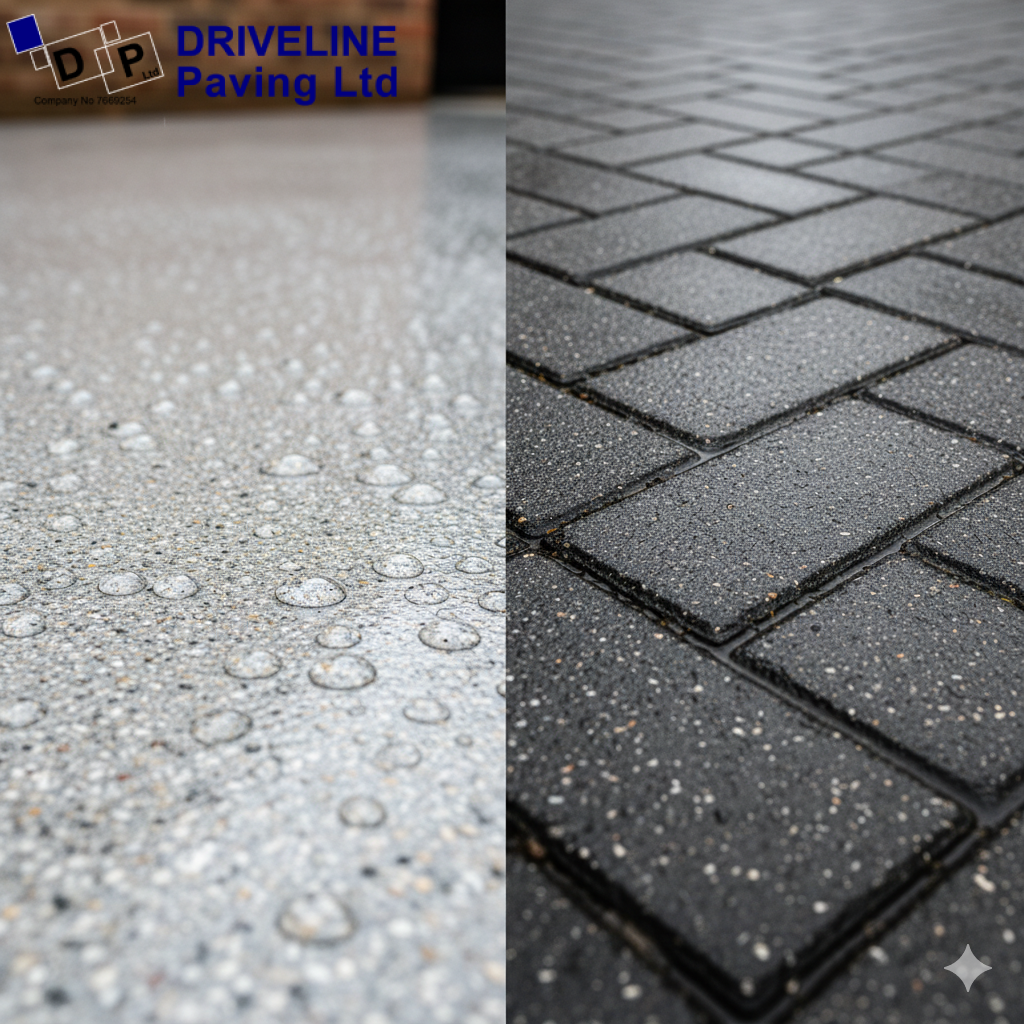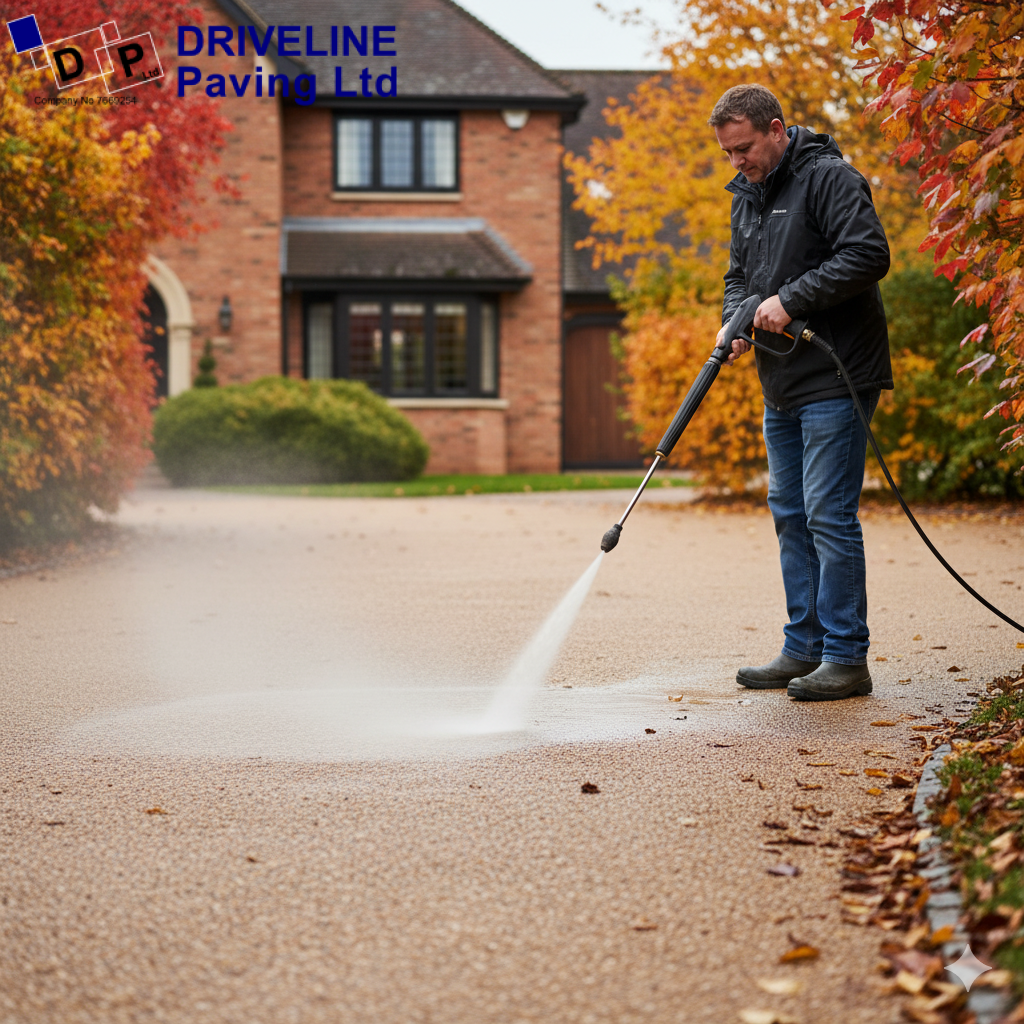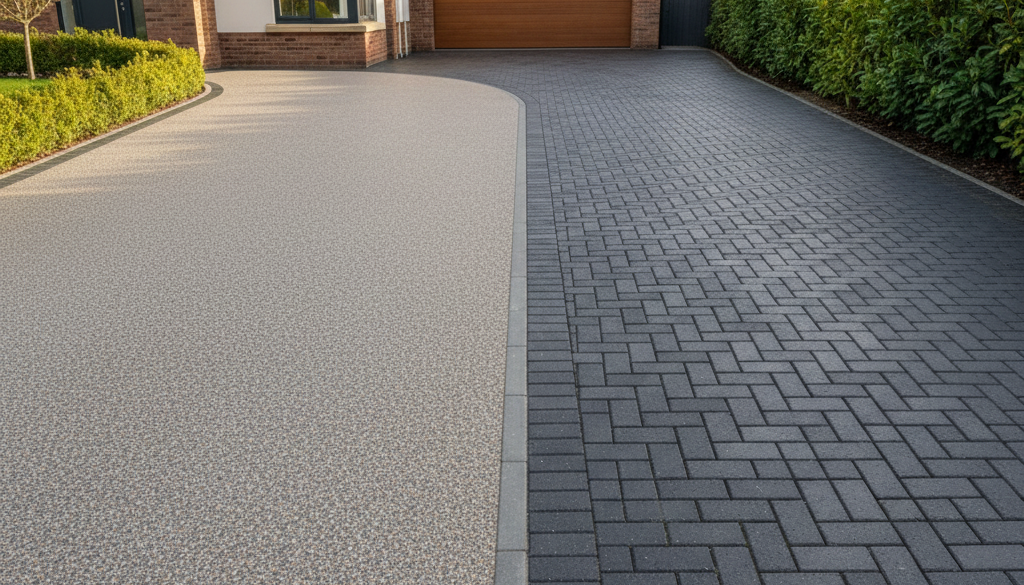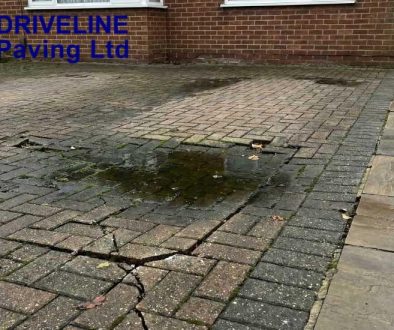Resin or Block Paving: Best Choice for Wet and Cold Weather
Rain, frost, and fluctuating temperatures can put any driveway to the test. For homeowners in Essex and North London, where damp conditions and cold winters are common, choosing the right driveway surface makes all the difference. Two of the most popular options—resin and block paving—both offer durability and aesthetic appeal, but they perform differently under wet and cold weather.
Understanding how each material reacts to moisture, frost, and heavy use helps you make the right long-term investment. Whether you prioritise low maintenance, drainage efficiency, or design flexibility, this guide compares the pros and cons of resin and block paving for year-round performance.
Weather Resistance: How Each Surface Responds
Resin driveways are known for their seamless, water-resistant finish. Because the surface is bound together with UV-stable resin, there are no gaps for water to settle. When installed with a permeable sub-base, resin driveways meet Sustainable Drainage System (SuDS) standards, allowing rain to filter naturally through the surface. This prevents puddles and reduces frost formation.
Block paving, by contrast, has small joints between bricks that allow limited water drainage. While this feature is helpful, it can also become a weak point if the sand joints erode or fill with moss. Water trapped between blocks can freeze in winter, slightly shifting the bricks over time. Regular joint maintenance is key to preventing this issue.
In short, resin offers better surface-level drainage, whereas block paving requires more upkeep to maintain its resistance to moisture.

Durability and Longevity
Both resin and block paving can last for decades when installed correctly, but they differ in how they age. Resin driveways are flexible and less likely to crack from frost heave or temperature changes. The bonded structure accommodates minor ground movement, making it ideal for the UK’s freeze–thaw cycles.
Block paving, on the other hand, is extremely strong under pressure. Individual blocks can bear heavy vehicle loads without damage, and any broken sections are easily replaced. However, block paving’s joints are more susceptible to movement if the sub-base isn’t compacted correctly or if frost penetrates the gaps.
Resin driveways resist cracking and colour fade, while block paving excels in physical strength and repair flexibility. Choosing between the two often depends on the type of use—resin for everyday residential driveways, block paving for areas with frequent or heavier traffic.
Maintenance Requirements in Cold Seasons
When temperatures drop, the difference in upkeep becomes more noticeable. Resin driveways need very little maintenance: an occasional pressure wash or sweep keeps them clean. Their smooth surface prevents moss and algae from taking hold, even in shaded spots.
Block paving requires slightly more effort. The sand between blocks can wash away during heavy rain or frost, encouraging weed growth. Re-sand and re-seal every few years to keep it stable and visually consistent. In winter, avoid rock salt on both surfaces—use fine sand or grit to maintain traction without staining or corrosion.
If low maintenance is a priority, resin is the clear winner for the colder months.

Drainage and Surface Safety
Good drainage isn’t just about appearance—it’s about safety. Standing water that freezes overnight turns into black ice, creating slipping hazards for pedestrians and vehicles alike.
Resin driveways excel here. Their porous design allows rainwater to drain through the surface instead of pooling on top. Even during sudden downpours, water quickly disperses, leaving the surface dry and slip-resistant. Many homeowners choose resin specifically for its anti-slip qualities during wet or icy weather.
Block paving provides moderate drainage if installed with permeable joints or specialist sub-bases. However, standard installations may need extra drainage channels to prevent puddles. Maintaining these channels through autumn leaf-fall is essential to prevent winter blockages.
Ultimately, both surfaces can perform well if designed properly—but resin offers built-in drainage advantages that make it especially reliable during winter months.
Aesthetic Appeal in Every Season
Resin driveways have a modern, sleek appearance that suits contemporary homes. Available in a wide range of colours and aggregates—from subtle greys to warm natural tones—resin adds instant kerb appeal and complements all types of architecture. Its smooth texture resists staining and stays vibrant even in constant rain or low sunlight.
Block paving brings timeless charm and versatility. It’s ideal for homeowners who prefer classic styles, decorative patterns, or contrasting borders. With options like herringbone or basketweave layouts, it’s possible to create distinctive designs that highlight the property’s features. However, in wet or frosty weather, unsealed block paving may darken or lose brightness until it dries.
Aesthetic preference often determines the choice: resin for contemporary simplicity, block paving for traditional or decorative finishes.
Installation and Curing in Autumn and Winter
Seasonal conditions influence how each driveway type is installed. Resin must be laid on a clean, dry base in temperatures above 5°C to ensure proper curing. Professional installers schedule resin applications during mild, dry periods—typically autumn is ideal before frost sets in.
Block paving, meanwhile, is less sensitive to temperature. It can be installed in cooler conditions as long as the ground isn’t frozen. However, heavy rain can still delay progress or affect sand bedding stability. Professional installers prepare drainage and compact bases carefully to prevent future movement once frost arrives.
Both materials benefit from expert installation and appropriate weather timing. Rushed or poorly timed work in damp conditions risks curing failures and long-term defects.
Repair and Replacement Over Time
A major advantage of block paving is its modular design. If a section becomes damaged by frost or oil stains, individual blocks can be lifted and replaced easily. This keeps maintenance costs low and avoids the need for full resurfacing.
Resin driveways, while low-maintenance, require professional attention for repairs. Minor damage can be patched seamlessly if addressed early, but large-scale repairs usually need re-laying the affected area. Despite this, well-installed resin rarely needs major work due to its sealed surface and resistance to weather damage.
Both materials provide good repair options, but block paving’s replaceable sections offer more flexibility for small-area fixes.
Cost and Long-Term Value
Cost depends on several factors, including area size, groundwork condition, and chosen materials. Generally, block paving has a slightly lower initial cost than resin but higher maintenance over time. Resin installations may cost more upfront but require far less upkeep and cleaning.
Over a decade, both materials offer similar value when maintained properly. The difference lies in convenience: resin offers minimal maintenance and a modern look, while block paving provides classic appeal and easy repairability. The true measure of value comes from professional installation—cheap work on either surface will deteriorate quickly, regardless of material.
Which Performs Best in Wet and Cold Weather?
When it comes to overall performance during the UK’s wetter, colder months, resin driveways have the edge. Their porous structure, flexibility, and frost resistance make them ideal for areas prone to moisture and freezing temperatures. They stay cleaner, drain faster, and require little upkeep.
Block paving remains an excellent alternative for homeowners who prefer decorative layouts or traditional aesthetics. When installed and sealed correctly, it performs reliably through winter, provided the joints are maintained. Both materials can handle harsh conditions—but resin offers slightly more convenience and reliability in prolonged wet weather.
Choose Expert Installation with Driveline Paving Ltd
Whether you prefer the refined appearance of resin or the timeless strength of block paving, the key to lasting results lies in professional installation. Proper groundwork, drainage design, and sealing protect your investment from weather damage and ensure decades of dependable performance.
Driveline Paving Ltd specialises in high-quality driveway installation across North London and Essex, combining precision workmanship with durable materials built for the UK climate. Our experienced team can help you choose the right surface for your home, ensuring it performs beautifully through every season.
For expert advice and a free consultation—contact Driveline Paving Ltd today to discover the perfect weather-resistant driveway solution.



